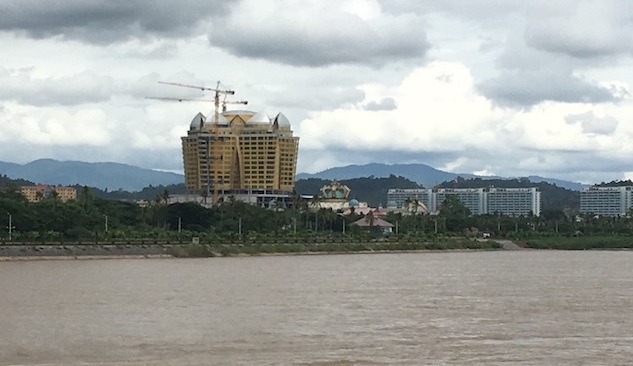Organized crime gangs have effectively taken control of a host of Special Economic Zones (SEZs) close to the borders of China and Thailand, and are posing a growing threat to the security of countries in both Southeast Asia and areas further afield, according to the UN Office of Drugs and Crime.
An estimated 240 casinos have been built in 120 SEZs in the Mekong subregion and some of these areas have become hubs of serious criminal activity, UNODC representative for Southeast Asia and the Pacific Jeremy Douglas said in a panel discussion in Bangkok on June 15.
Gangs running the SEZs were involved in trafficking large quantities of illicit drugs, laundering billions through unregulated casinos, while running online gambling for people in neighboring countries via easy-to-access fintech apps and call centres involved in crypto scams, often undertaken by people lured into these areas and held against their will, the UN official said.
“A lot of these [ASEAN] governments see these zones as extra-territorial,” Douglas said, adding “they’re not applying national laws.. so it’s attracting criminal groups. There’s been a massive influx in these areas by organized crime.
“We’ve had countries say ‘We cannot go in’. For example, at the King’s Romans [casino in an SEZ in Bokeo in northern Laos], the police don’t enter without permission … so this is highly problematic,” he said.
“The internet is facilitating global interconnectivity for these businesses that are operating from there. This is a security threat now, not just for the [Mekong] subregion, but starting to become a regional, and potentially, a global security challenge.”
ALSO SEE: Myanmar Modifies Forex Order to Exempt Foreign Groups
Gangs Claimed Links to BRI
Jason Tower, country director for Burma at the US Institute for Peace (USIP), who spoke at the same event, said the Burmese military had allowed a local Karen Border Guard Force known as the Democratic Karen Benevolent Army (DKBA) to operate what he called a “crime city” with a Chinese syndicate at an enclave called Shwe Kokko, opposite Mae Sot on the Thai-Myanmar border.
Shwe Kokko, Tower said, was run by a convicted criminal from China who “presented himself as implementing the project as part of the Belt & Road scheme in Myanmar”.
“Criminal actors are leveraging the Belt & Road Initiative in that way, as a means to legitimize some of their activities,” he said.
Officials at the Chinese embassy disassociated Beijing from the Shwe Kokko project in August 2020 when the NLD government asked them to clarify the status of the SEZ. Over 10,000 Chinese worked at Shwe Kokko prior to the coronavirus in 2019, Tower said, at the main casino and in adjacent buildings where people were allegedly involved in cold calling for a fraudulent crypto coin and other scams.
Covid-19 had a severe impact on Shwe Kokko and other ‘special regions’ on the Chinese border in the Kokang, Mong La and Wa “special regions” run by ethnic border guard forces allied to the military, as Beijing ordered tens of thousands of its people to return home after the start of the pandemic.
But things had deteriorated since the military coup in Myanmar in February 2021, which had led to “much more sinister activity”, Tower said. Groups in Shwe Kokko were luring people to “well-paid” jobs in these areas, or simply kidnapping Chinese speakers, who then found themselves held against their will and forced to participate in telecom scams.
There were “estimates of 2-3,000 people held against their will in Shwe Kokko,” he said, noting that area, just north of Myawaddy in Myanmar, had become lawless after the coup, although Thai officials had managed to help some of citizens get out at various times.
Online gambling at “Shwe Kokko” was conducted via a Fincy-style app, as it was a convenient way of funding gambling accounts, Tower said.
“A lot of these zones are reliant on crypto and those types of tech to transfer funds out,” he said. Meanwhile, border guard forces in the Kokang and Mong La areas operated so many casinos, they were “branding themselves as the new Macau”, Tower said.
In May 2023, the operator of the Shwe Kokko site denied these allegations and claimed he operated a legitimate real estate development.
Junket Sector ‘Will Shift to ASEAN’
Douglas, the UNODC rep, noted that China had made a concerted effort to crack down on junket operators in Macau, but said that move was likely to have a significant impact on the wider region as individuals involved in the junket sector were “not just criminal figures but also billionaires”.
“That business is already in this region [Southeast Asia] and it’s highly likely to be entrenched here, if not based in the region,” he warned.
In 2019, UNODC estimated that drug production in the Golden Triangle region – the “meth[amphetamine] economy” – was worth around $60 billion, but Douglas said illicit economies in Myanmar’s borderlands had expanded dramatically since then.
Over 172 tonnes of meth had been seized by Thai officials in 2021, with seizures in Laos up by 600% in the same year.
There was also a vast trade in precursor chemicals flowing into the Golden Triangle, which are used to make meth tablets and other illicit drugs. Douglas said 13 tonnes of precursors was needed to make one tonne of meth, so the amount of these – legal – drugs flowing freely from China and adjacent countries was also worth billions of dollars.
The drug trade in the Golden Triangle had “long been controlled out of Hong Kong – Hong Kong and Taiwan together, essentially” and these triads had long done business in Myanmar, but they sometimes had corporate entities or shelf companies set up in Hong Kong, because it was easy to get money in and out of the city.
• Jim Pollard
NOTE: This report was updated on May 12, 2023 to add the denial of criminal activities at Shwe Kokko by the developer Yatai.
ALSO on AF:
China’s 58.com Under Fire Over Human Trafficking Claim
With $7.7bn Lost, Cryptoscams Hit A New All-Time High in 2021
Arrest of Macau Junket Mogul Rocks World’s Biggest Gambling Hub
























